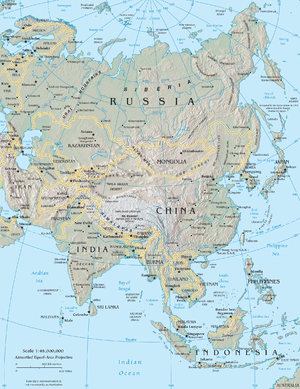 Image via WikipediaBreaking News and Opinion on The Huffington Post
Image via WikipediaBreaking News and Opinion on The Huffington PostZeroing Out Public Broadcasting Does Not Add up
Posted: 2/23/11 4:40:23 PM | Updated: 2/23/11 4:40:16 PM
There is some pretty shaky math coming out of Congress these days. The spending bill passed by the House of Representatives zeroes out funding for public broadcasting, eliminating every last cent of the $430 million in federal appropriations for the Corporation for Public Broadcasting (CPB). For deficit hawks looking to cut costs, those savings might look good on paper. But do the numbers really add up?
Just a few weeks ago, President Obama devoted a large portion of his State of the Union address to the America's need to prepare for the future through education. "The quality of our math and science education lags behind many other nations," warned the president. "If we want innovation to produce jobs in America and not overseas -- then we also have to win the race to educate our kids."
Winning that race is a goal we should embrace. But right now, we are not even in contention. The United States used to lead the world in the number of 25- to 34-year-olds with college degrees. Now it ranks 12th among 36 developed nations, according to the College Board. And not only are we losing this critical race, we are actually heading the wrong way around the track. In a desperate -- and certainly shortsighted -- reaction to the economic downturn, education is falling under the axe. Across the nation, states' budget crunches have school districts cutting teaching positions, dialing back school hours, jamming more students into classroom, slashing extracurricular programs, and closing schools altogether.
Let's face it. We aren't going to catch up with the rest of the world by making it harder for our kids to learn.
Against this backdrop, public broadcasting becomes even more valuable than it has ever been. PBS member stations are America's largest classroom, available to all of America's children -- including those who cannot attend preschool. And a growing body of research shows that public television programs help children learn more effectively, starting from a very young age.
For example, a study entitled G Is for Growing found that children who watched Sesame Street in preschool spend more time reading for fun in high school, and they obtain higher grades in English, math, and science. A study conducted by Shelley Pasnik of Education Development Center and William Penuel of SRI International showed that preschool children who participated in a curriculum incorporating PBS KIDS video and games into classroom instruction were better prepared for kindergarten than those who didn't. Independent research also demonstrates that PBS multimedia content is accelerating learning for kids and closing the achievement gap. Recent research reveals that kids who played with the PBS Martha Speaks app made significant gains, increasing vocabulary as much as 31 percent in a two week period.
In short, PBS content for children is proven to teach key educational skills, cultivating and challenging the critical thinkers and innovators of tomorrow. These programs, which are available to virtually every child in the nation, are a jump-start for learning at a time when America's education engine is threatening to stall. And this promising investment in America's future is available for an annual cost of about $1.00 per American.
I'm encouraged to find that President Obama has a better grasp of the value of public broadcasting than his colleagues in the House. In his FY 2012 budget, made public two days after the House proposal, he has preserved funding for the Corporation for Public Broadcasting. But, clearly, Congress will not approve this funding without a fight.
The math is simple. To disregard the immense value of public broadcasting at this decisive moment in our history -- when education is so critical and yet so beleaguered -- would be an object lesson in "penny wise and pound foolish." But if our legislators in the House are having trouble with these equations, I have no doubt that legions of PBS-educated kids will be ready to help them put two and two together.














